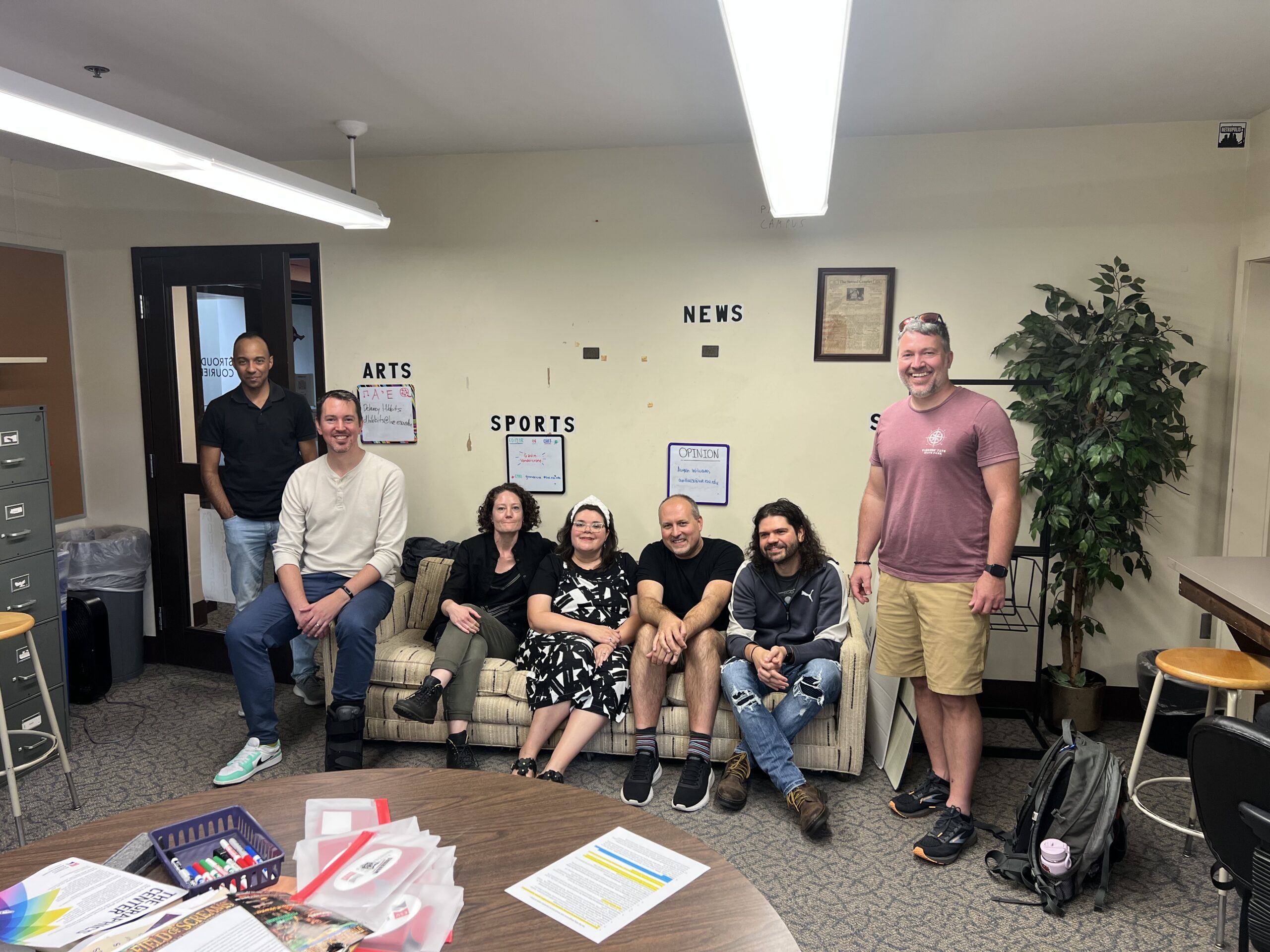Kyle Cave
Staff Writer
The Stroud Courier has had many staff writers and editors in its almost 100-year history at ESU. How many of those editors get a chance to come back and reflect on their past and give advice to young journalists of the future?
This past week, previous writers and editors of The Courier were able to return to our office one last time. The group spent multiple hours reminiscing over their time at ESU and the memories they made inside The Courier’s office.
The Courier was able to interview three of them.
The first person interviewed was Julian Gautier. A former English and Political Science student who wrote for The Courier in the mid-2000s. Gautier says the thing he misses most about The Courier is putting the paper together on Mondays and Tuesdays. Gautier also says he loved being “In a room full of people who were excited about starting a career.”
Gautier says he was able to get “a little taste of so much” and gained some real-world experience as a journalist. Gautier also says through The Courier, he was able to see what he was good at, whether that be a “good writer or a graphic designer.”
Gautier says his favorite story and interview he worked on was during the 2004 Presidential Campaign, when a presidential candidate would come to ESU and campaign.

Gautier was able to score an interview with the candidate. He was not able to recall the name of the candidate who came to ESU at the time, but he described him as a “really funny character.” We asked Gautier to describe The Courier with one word, he described it as “educational.”
Tom Krivak was the second person The Courier interviewed. Krivak was a former Forum (Opinion) editor and a copy editor. Krivak says what he misses the most about The Courier is the people he used to work with, and all of them “working towards a common goal.”
Krivak also says he loved the idea of informing the student body of what was happening on campus and helping to inform the student body.
Krivak says he took a lot away from The Courier. Krivak currently works as a consultant and says he learned most of his interviewing skills from The Courier.
Krivak advised younger journalists, saying that being an active listener is one of the most important parts of the job. Krivak also encouraged younger journalists to dig and not be afraid to ask pressing questions.
“Ask prodding questions, don’t be satisfied with surface-level questions, you don’t just leave with the story, you leave with quotes,” said Krivak.
He also tells younger journalists that the job of journalists often involves angering individuals and that journalists need to get used to that.
“Get comfortable with being uncomfortable, get facts, and speak truth to power. You will make people mad and piss people off, that’s the rule of journalism,” said Krivak.
Krivak says in The Courier, he used the paper to voice out grievances, especially against the ESU administrations. His favorite Op-Ed he’s written was about a time the administration took the toaster out of his dorm and left a note saying his toaster was “an ignition device.” He said he came to The Courier office, got on the Mac, and immediately wrote about the “ludicrousness of his toaster getting stolen.”
The final person we got to interview was David Hopper. Hopper was a computer science major at ESU. David says what he misses the most about The Courier is the people, deadlines, late nights and being under stress and pressure.
“It was fun to see that,” said Hopper.
Hopper says he didn’t get into media after college but says his experience at The Courier gave him an “appreciation for the media landscape”.
During the interview, Hopper gave his perspective on a wide variety of issues, including the current media landscape. He says that since 2005, “polarization and fragmentation” have increased dramatically.
Hopper also tackled how quickly and rapidly we receive information daily, and how that is actively harming our society because, instead of getting regular information, we are getting narratives.
“How are we going to work to solve a real problem if there’s no common truth?” asked Hopper.
Hopper says the way we can solve this information crisis, he believes is by engaging our brains in “a more grounded truth.”
Hopper also says the current media landscape needs to change to a place where it’s less about playing on cheap, short-form content, but a more traditional atmosphere of truth first and entertainment later. He described this type of content as “junk food for the brain.”
Hopper also brings up Artificial Intelligence and how he personally lost his job to AI. Hopper says humans moving forward are going to have to figure out how to co-exist with AI while finding meaning.
“What human capacity do we have to improve ourselves, in an era where machines are going to best us? I don’t have an answer for that,” said Hopper.
Before their departure, a group photo was taken to mark a milestone in how The Courier shaped their lives for their careers, and the friends they’ve made for life.

